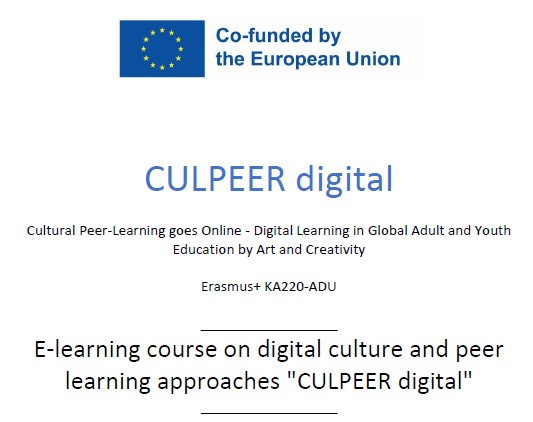E-Learning Course
Culpeer family of projects have come a long way.
Combining cultural techniques with peer learning within creative workshops, involving young people from the Global South and the Global North for the purpose of inclusion and integration, started a number of years before the formation of the so-called CULPEERapproach. CULPEER as an idea and methodology is rooted in the KinderKulturKarawane(Children’s Culture Caravan) initiative, which has been bringing artistic cultural groups from the Global South on educational tours in the Global North for almost 25 years now.
Starting with KiKuKa's success shared with several countries, a strong consortium emerged, leading to the EuropeAid project "Strengthen Creative Cooperation" (2014-2016). This initiative integrated cultural peer learning to support Millennium development goals through performances and activities.
The journey continued with the Erasmus+ initiative "CULPEER," focusing on youth integration and developing guidelines for the CULPEER approach in schools. The period 2016-2018 saw the performance "Todos somos uno!" and the development of e-learning content.
After networking and learning, an expanded consortium, including partners from Bolivia and Tanzania, continued the approach in "CULPEER 4 Change" (2019-2022). Activities included murals, conferences, youth initiatives, and e-learning focused on SDGs like Children's Rights, Climate Change, and Migration.
Adapting to challenges, the Culpeer family created the Culpeer Digital e-course, showcasing their cultural peer-learning methodology in a digital format. It's designed for pedagogues, trainers and others working in adult and youth education, providing a valuable intercultural digital learning experience.
Join the Culpeer journey and use the e-course to bring the world into your classroom!
Authors:Andrea Anzanello, Teresa Krohn, Carlo Tiedge, Eva Karakatsani, Ivana Tsvetkova, IwonaFrydryszak, Manca Šetinc Vernik, Michal Patyna, Rene Alimisi, Zornitsa Staneva
Module 2 - The role of pedagogues and other trainers
The multipliers play a much larger role in bringing attention to new methods. Pedagogues, social workers and teachers play an important role by implementing the methods through creating online activities. In these formats, they still adjust the peer-to-peer principle, but their role as cultural mediators, moderators, translators is more complex.
Module 4 - The importance of digital creative learning for a person with social barriers
Digital creative learning can play an important role on the road to ensuring social inclusion. In itself, social inclusion helps to improve participation for all in society through enhancing equal access to resources and services. Inclusion requires the distribution of opportunities and resources in a way that minimises disadvantages and marginaliz ...
Module 5 - Gaining knowledge and understanding of Global Learning
The world is diverse. Even in the way we perceive it. You could even say that there are as many perceptions of the world as there are people on this planet. How we imagine the world and how we interpret these ideas is not only determined by our upbringing and education system, but also by the social norms and values of the part of the world we were ...
Module 6 - Transfer of knowledge into Creative Action – Examples
of Exchange
Based on our previous experiences in using cultural peer-learning approaches for exchanges between youth from the Global North and the Global South and on the lessons learned during the Covid-19 health crisis, our team created a number of digital methods, which convert cultural, physical and synchronous interactions into digital versions.
Module 7 - Online pedagogues training: How to train the audience
Educators have the complicated task of providing trainees with knowledge, that is useful, interesting and is retained. Most, if not all, educators work in diverse classrooms - trainees have different backgrounds, different levels of interest in a particular subject, in some cases disabilities, different retention rates and abilities as well as, acc ...








